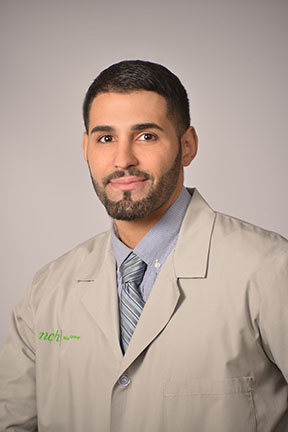“Maskne” – Just when you thought you were over your teens
November 10, 2020

During this COVID-19 pandemic, scientists and infectious disease experts like Dr. Fauci of the National Institute for Allergy and Infectious Diseases, tell us our best protection is a properly worn face mask, covering both the mouth and nose. Although we have often seen travelers from other countries wearing this simple protective device, for many Americans this is the first time we’ve worn one regularly. If you are experiencing a bout of pimples where the mask touches your face, be assured you are not alone. While unpleasant, this “side effect” of mask wearing does not negate the protection of wearing a mask outside our homes.
NCH Medical Group’s new dermatologist on staff, Ahmad Jabbar, M.D., is a board-certified Fellow of the American Academy of Dermatology. He took some time to answer our questions about mask acne.
Q: What is mask acne aka “maskne?”
Dr. Jabbar: Maskne is a new term coined to describe a worsening of pimples and blemishes resulting from wearing face masks for extended periods of time. This can cause friction, heat/humidity and obstruction of the skin.
Q: Who can get maskne?
Dr. Jabbar: Anyone. Since masks are essential throughout this pandemic, it’s important to do whatever we can to overcome concerns and minimize risks of a breakout since, for some, wearing a mask can result in breakouts or rashes.
Q: Is maskne a brand-new phenomenon during the pandemic?
Dr. Jabbar: Maskne has been a long-standing issue for those who require masks on a regular basis, such as healthcare professionals or construction workers. As a result, we have gained more insight on the condition throughout the years.
Q: How can we prevent maskne?
Dr. Jabbar: For starters, I recommend using a cotton or polyester mask due to its softer texture which results in less friction. Make sure your face mask is not too tight or too loose. Wash your face regularly to minimize excessive oils by using a fragrance-free cleanser and regularly applying a fragrance-free, oil-free moisturizing lotion that contains hyaluronic acid or dimethicone to provide an extra barrier of protection. Lastly, avoid make-up on covered areas and wash your reusable masks as frequently as you can.
Q: What can we do to treat maskne?
Dr. Jabbar: Try using a glycolic acid or salicylic acid wash or a conservative dose of benzoyl peroxide cream/gel regularly for spot treatment. Avoid applying such products excessively, as they can cause more irritation with tightly-fitted masks.
Q: Does mask wearing cause other skin-related conditions?
Dr. Jabbar: Besides the more commonly associated acne, masks can cause or trigger an allergic reaction, rosacea or seborrheic dermatitis (dandruff).
Q: Does washing your mask help maskne?
Dr. Jabbar: Wash your mask frequently as they can harbor dirt, oil and bacteria when not cleaned or replaced regularly.
Q: Is there any value to home grown acne treatment, like sleeping with toothpaste on the affected area?
Dr. Jabbar: While products such as toothpaste, lemon juice and witch hazel can offer improvement of acne by “drying it out,” they can also cause a lot of irritation in those who are susceptible. Use cautiously and seek input from a dermatologist before proceeding.
Dr. Jabbar: Cosmetic face masks are very popular and easily found in stores like Walmart and Target now. Do you have any thoughts on these, pro or con?
Dr. Jabbar: There are many cosmetic face masks available at present. I most definitely believe that many of these can serve as a good adjunctive therapy for acne if applied properly on desensitized skin.
Q: At what point should someone make an appointment with a dermatologist?
Dr. Jabbar: If you don’t see a difference in your skin after implementing the skin care tips mentioned, then it may be time to call your dermatologist.
Dr. Jabbar is available for appointments at 1051 West Rand Road, Suite 210 in Arlington Heights. Please call 847-725-8401.